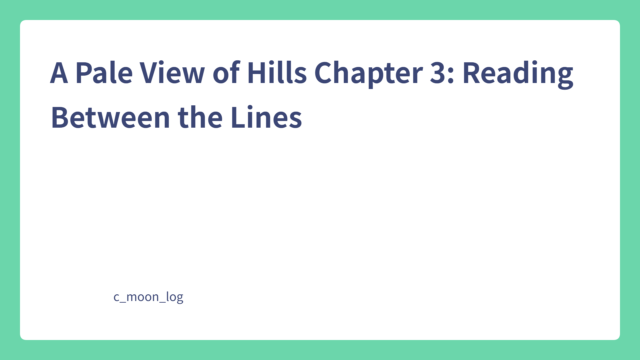「遠い山なみの光」を読んで英語力アップ!【第1章】

祝映画化!ヽ(=´▽`=)ノ
2025年9月5日全国ロードショー!
カズオ・イシグロの長編小説としての処女作「A Pale View of Hills」(遠い山なみの光)は、1982年に発表され、ウィットブレッド賞を受賞した名作です。
私も大好きな作品で、本は日本語版と英語版、そして耳読書できるAudibleのオーディオブックも持っています。
長崎出身のイシグロさんが、戦後の日本・長崎を舞台に描いた繊細で美しい文学作品は、英語学習者にとって有益かつ貴重な教材。
本ブログでは、その第1章を詳しく解説し、TOEICや英語学習に役立つ表現をご紹介します。
この機会にぜひ、ノーベル文学賞作家の代表作で、文学的な美しさと実用的な英語表現を同時に学びましょう。
📖 まずは本を手に入れよう!
この記事を最大限活用するために、カズオ・イシグロの名作『遠い山なみの光』をお手元に用意することをお勧めします。英語学習とTOEIC対策に最適な一冊です!
✨ 送料無料・楽天ポイント還元でお得にゲット!
Are you ready to unlock the secrets of advanced English through one of literature’s most subtle masters? Ishiguro’s debut masterpiece holds the key to sophisticated vocabulary, complex grammar, and cultural nuances that will elevate your TOEIC score and transform your English communication skills forever.
楽天ブックスで英語版「A Pale View of Hills」を今すぐ購入
♱⋰ ⋱✮⋰ ⋱♱⋰ ⋱✮⋰ ⋱♱⋰ ⋱✮⋰ ⋱♱⋰⋱✮⋰⋱
第1章のあらすじ
第1章では、主人公のエツコ(悦子)が現在イギリスに住んでおり、娘のニキ(Niki)と会話をしている場面から始まります。
エツコは過去の記憶、特に長崎での生活について振り返ります。
章の中心となるのは、彼女の最初の娘ケイコ(景子)の自殺についての言及と、それに関連する過去への回想です。
重要な英語表現とTOEIC頻出語彙
感情表現
“I was rather disturbed”
- 意味: かなり動揺した
- TOEIC頻度: ★★★★☆
- 類似表現: upset, troubled, unsettled
- 例文: I was rather disturbed by the unexpected news.
“It still troubles me”
- 意味: 今でも悩ませる、気にかかる
- TOEIC頻度: ★★★☆☆
- 文法ポイント: 現在形で継続的な状態を表現
- 例文: The unresolved issue still troubles me.
時制と記憶の表現
“I can remember”
- 意味: 覚えている、思い出すことができる
- TOEIC頻度: ★★★★★
- 使い方: can + 動詞で「能力」を表す基本構文
- 例文: I can remember meeting her at the conference.
“those days when…”
- 意味: あの頃、~だった時代
- TOEIC頻度: ★★★☆☆
- 文法: 関係副詞whenの使用
- 例文: I miss those days when we worked together.
日常会話の重要表現
“What’s the point in…”
- 意味: ~することに何の意味があるのか
- TOEIC頻度: ★★★☆☆
- 使用場面: 議論や説得の場面
- 例文: What’s the point in arguing about it now?
“I suppose”
- 意味: ~だと思う(やや控えめな推測)
- TOEIC頻度: ★★★★☆
- ニュアンス: I thinkより控えめで丁寧
- 例文: I suppose we should start the meeting now.
場所・環境の描写
“the view from…”
- 意味: ~からの眺め
- TOEIC頻度: ★★★★☆
- 関連語: landscape, scenery, vista
- 例文: The view from the office window is spectacular.
“in the distance”
- 意味: 遠くに、はるかかなたに
- TOEIC頻度: ★★★☆☆
- 前置詞: inを使うことがポイント
- 例文: We could see mountains in the distance.
文学的技法と英語表現
間接話法の巧妙な使い方
筆者カズオ・イシグロは直接的な描写を避け、登場人物の記憶や感情を間接的に表現します。
例: “She had mentioned” / “I had been thinking”
- 技法: 過去完了を使った時制の層構造
- 効果: 記憶の曖昧さと時間の流れを表現
- 学習ポイント: 過去完了は「過去のある時点より前」を表す
控えめな表現(Understatement)
英国文学の特徴である控えめな表現が随所に見られます。
例: “rather difficult” / “somewhat concerning”
- 特徴: 強い感情を抑制した表現
- TOEIC応用: ビジネス英語での丁寧な表現として活用
- 類似表現: fairly, quite, relatively
語彙力アップのコツ
頻出単語の確認
- disturb (動詞) – 妨げる、動揺させる
- 派生語: disturbance (名詞), disturbing (形容詞)
- TOEIC例: Please do not disturb during the presentation.
- mention (動詞) – 言及する、触れる
- 慣用表現: not to mention (~は言うまでもなく)
- TOEIC例: She mentioned the deadline during the meeting.
- suppose (動詞) – 仮定する、推測する
- 慣用表現: I suppose so (そう思います)
- TOEIC例: I suppose the project will be completed on time.
文脈から推測する力を養う
本作のような芸術的な文学作品では、直接的な説明がとても少ないため、文脈から意味を推測する力が重要。
これはTOEICリーディングセクションでも必須のスキルですね。
実践的な学習法
音読練習
- 1日10分間、第1章の一部を音読
- カズオ・イシグロの文体の流れを体感
- 発音とリズムの向上
要約練習
- 各段落を英語で3文以内に要約
- 主要な情報を抜き出す練習
- TOEICパート7対策に効果的
語彙ノート作成
- 新出単語とその使用文脈を記録
- 同義語・反義語・派生語も併記
- 定期的な復習で定着を図る
まとめ
「遠い山なみの光」第1章は、英語学習者にとって宝の山です。
イシグロさんの繊細な文体から学べる表現技法は、TOEICはもちろん、より高度な英語コミュニケーション能力の向上に直結します。
文学作品を通じた英語学習の魅力は、言語の美しさと実用性を同時に体験できること。
ぜひこの機会に、ノーベル文学賞作家の作品を通じて、あなたの英語力を新たな次元へと押し上げてください。
次回予告: 第2章では、エツコと佐知子の関係性を通じて、より複雑な英語表現と心理描写の技法を詳しく解説します。お楽しみに!
♱⋰ ⋱✮⋰ ⋱♱⋰ ⋱✮⋰ ⋱♱⋰ ⋱✮⋰ ⋱♱⋰⋱✮⋰⋱
English Summary
Teacups and Devastation: On the Quiet Dignity of Memory
I must confess, upon reading the opening chapter of Ishiguro’s “A Pale View of Hills,” one finds oneself quite moved by the author’s remarkable restraint. There is something profoundly familiar about his approach—
that particular quality we possess of saying the most devastating things in the most measured of tones.
The way Etsuko speaks of her daughter’s suicide, with such careful understatement, reminds me rather of how one might discuss an unfortunate turn in the weather. “It still troubles me,” she says, as though referring to a persistent draught rather than the most shattering experience a mother might endure. This is not callousness, mind you, but something far more sophisticated—the kind of emotional intelligence that understands some wounds are too deep for theatrical display.
What strikes me most profoundly is Ishiguro’s understanding that memory is not merely recollection but reconstruction. Each time Etsuko returns to those days in Nagasaki, she is not simply remembering but actively reshaping her past, much as one might tend a particularly cherished garden. The elegance lies not in what is said, but in what remains beautifully, deliberately unspoken.
The sensibility I recognise appreciates how Ishiguro refuses to indulge in melodrama. There is a quiet dignity in Etsuko’s narrative voice that speaks to something essentially human—
our capacity to endure the unendurable whilst maintaining the courtesies of civilised discourse. It is, dare I say, rather like watching someone serve tea with impeccable manners whilst their world crumbles silently around them.
One cannot help but admire such literary craftsmanship. It is the sort of writing that makes one pause, teacup halfway to lips, and contemplate the extraordinary depths that lie beneath the most ordinary of conversations.
このブログがあなたの英語学習の一助となれば幸いです。質問やコメントがありましたら、お気軽にお聞かせください。














